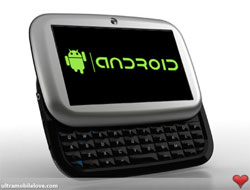There will be netbooks ... Android in the second quarter
Freescale said it will begin shipping the chipset for the Android mobile open source platform of the Google search giant since the next quarter.
Losing Android
Freescale began producing micro-chips for netbooks last month. The company will also cooperate with two wireless technology firms, Wavecom and Option, to provide super-fast 3G connectivity for high-end netbooks.
If you do not know, netbooks are a new term, used to refer to ultra-small, compact, low-profile notebooks, which are primarily web-browsing and selling for less than $ 500.
 Android will dock at netbook? Source: Mobilemag The netbook market has grown at a "boom" rate over the past year, following the impressive introduction of Asus EEE PC. This is still a rare bright spot for the PC industry, despite the global economic downturn.
Android will dock at netbook? Source: Mobilemag The netbook market has grown at a "boom" rate over the past year, following the impressive introduction of Asus EEE PC. This is still a rare bright spot for the PC industry, despite the global economic downturn.
Meanwhile, Android open source platform is a strategic weapon for Google to encroach into mobile districts. The intention of Google is to bring Android to every handheld device (PDA, smartphone, laptop, netbook), but so far, only a few phone companies have built Android smartphones only.
The gloomy economic situation makes technology companies shy and more hesitant for all risky experiments. So, although many people have expected the 2009 Mobile World Congress Exhibition to be Android's banquet, in fact, this operating system is almost lost.
Occasionally, there are a few small phone companies announcing products based on the Android platform, while giants like Samsung announced: not ready to release Android phones before the end of the year.
Brave decision
So Freescale's decision to bring Android to netbooks is truly "brave". It can be said that Android is a gamble "get eaten, fell back" by Freescale at this time, because in the fight against wireless giants like Qualcomm or Texas Instruments, Freescale is much weaker.
The company has been losing money continuously in the past few quarters, although its chip can connect to computer memory much cheaper than its rivals.
The main users that netbooks target are young people, low-income people or those wishing to use two parallel computers.
Freescale predicts netbook sales this year will double compared to last year, reaching about 30 million units. Research firm ABI Research even offers a higher estimate of 35 million devices.
" Because of the low cost, the majority of netbooks will only be equipped with wi-fi technology. But for professional mobile users, 3G connectivity is indispensable, " said Glen Burchers, Marketing Manager. Freescale said.
Along with Google Android, Freescale will also support 3G operating systems from Phoenix Technologies and Xandros since next quarter.
Good, better, best
Netbooks are now the new battleground between Intel's low-cost Atom chips and ARM chips on one side. Freescale claims to be an ally of ARM, because its ARM chip life is up to 8 hours, four times longer than Atom.
That's not to mention they also emit less hot air, eliminating the need to use cool fans and the price is much cheaper.
Mr. Burchers believes that at the peak of the time, ARM could control up to 50% of the world netbook chip market. The first models of netbooks using ARM chip designs will hit the market this summer.
Even so, Mr. Burchers admitted that: " In developed countries, you will come across good, better and best products. I think better and better products will be based on ARM, good. most must be Atom chip combined with Windows operating system ".
The cheapest price of netbooks today is about $ 200, but Freescale predicts that by the end of the year, ARM systems will drop to $ 100.
" I think this is a huge potential market. Nobody really needs a netbook but they want it. And for $ 199, this is a perfect Christmas or birthday gift ."